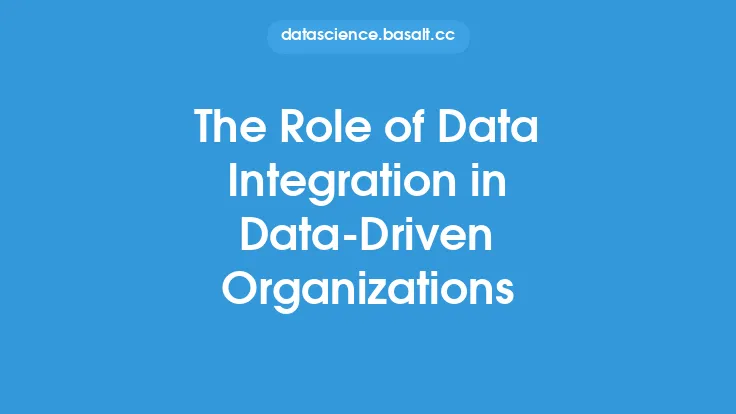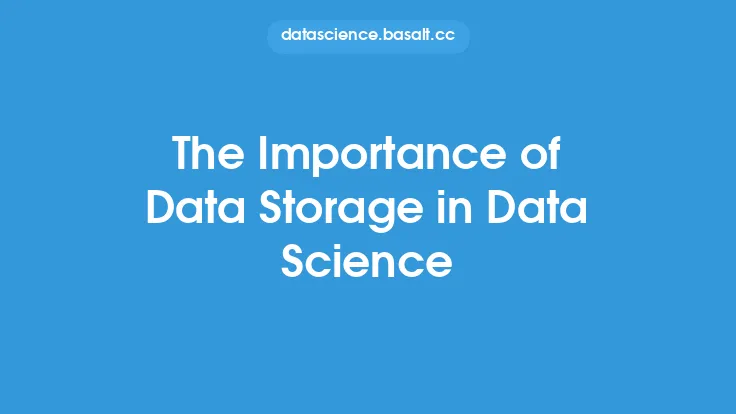In today's data-driven world, organizations are generating and collecting vast amounts of data from various sources, including social media, IoT devices, and customer interactions. This data is a valuable asset that can provide insights, drive business decisions, and create competitive advantages. However, managing and storing this data effectively is a significant challenge. Scalable data storage is critical for data-driven organizations to ensure that their data infrastructure can grow and adapt to changing business needs.
What is Scalable Data Storage?
Scalable data storage refers to the ability of a data storage system to increase its capacity, performance, and functionality as the organization's data needs grow. It involves designing and implementing a data storage infrastructure that can handle large amounts of data, support high-performance applications, and provide flexible and scalable storage options. Scalable data storage is essential for organizations that need to store and manage large amounts of data, such as those in the finance, healthcare, and retail industries.
Benefits of Scalable Data Storage
Scalable data storage offers several benefits to data-driven organizations, including:
- Improved data management: Scalable data storage enables organizations to manage their data more effectively, reducing the risk of data loss, corruption, and unauthorized access.
- Increased flexibility: Scalable data storage provides organizations with the flexibility to adapt to changing business needs, such as sudden increases in data volume or changes in data types.
- Enhanced performance: Scalable data storage systems can handle high-performance applications, such as data analytics and machine learning, without compromising data integrity or availability.
- Reduced costs: Scalable data storage can help organizations reduce their data storage costs by providing a flexible and scalable infrastructure that can grow with their data needs.
- Better data insights: Scalable data storage enables organizations to store and analyze large amounts of data, providing valuable insights that can inform business decisions and drive growth.
Key Characteristics of Scalable Data Storage
Scalable data storage systems have several key characteristics, including:
- Horizontal scaling: The ability to add more storage nodes or devices as data needs grow, without compromising performance or data integrity.
- Vertical scaling: The ability to increase the capacity and performance of individual storage nodes or devices, without disrupting data access or applications.
- Distributed architecture: A decentralized architecture that allows data to be stored and accessed across multiple nodes or devices, improving performance, availability, and scalability.
- Automated data management: The ability to automate data management tasks, such as data replication, backup, and recovery, to reduce administrative burdens and improve data availability.
- Support for multiple data types: The ability to store and manage multiple data types, such as structured, unstructured, and semi-structured data, to support diverse business applications and use cases.
Technologies for Scalable Data Storage
Several technologies can support scalable data storage, including:
- Object storage: A storage architecture that manages data as objects, rather than files or blocks, to provide flexible and scalable storage options.
- Distributed file systems: A file system that allows data to be stored and accessed across multiple nodes or devices, improving performance, availability, and scalability.
- Cloud storage: A storage model that provides on-demand access to scalable and flexible storage resources, reducing capital and operational expenses.
- Flash storage: A storage technology that uses flash memory to provide high-performance and low-latency storage options, ideal for applications that require fast data access and processing.
- Software-defined storage: A storage architecture that uses software to manage and provision storage resources, providing flexible and scalable storage options.
Best Practices for Implementing Scalable Data Storage
To implement scalable data storage effectively, organizations should follow several best practices, including:
- Assessing data needs: Understanding the organization's data needs, including data volume, growth rate, and performance requirements, to design an effective scalable data storage infrastructure.
- Choosing the right technology: Selecting the right storage technology, such as object storage or distributed file systems, to support the organization's data needs and applications.
- Designing for scalability: Designing the data storage infrastructure to scale horizontally and vertically, to support growing data needs and applications.
- Implementing automated data management: Automating data management tasks, such as data replication and backup, to reduce administrative burdens and improve data availability.
- Monitoring and optimizing performance: Monitoring and optimizing data storage performance, to ensure that the infrastructure can support growing data needs and applications.
Challenges and Limitations of Scalable Data Storage
While scalable data storage offers several benefits, it also presents several challenges and limitations, including:
- Complexity: Scalable data storage systems can be complex to design, implement, and manage, requiring specialized skills and expertise.
- Cost: Scalable data storage systems can be expensive to implement and maintain, requiring significant capital and operational investments.
- Data consistency: Scalable data storage systems can compromise data consistency and integrity, particularly in distributed architectures, if not designed and implemented correctly.
- Security: Scalable data storage systems can introduce new security risks, such as unauthorized access and data breaches, if not properly secured.
- Vendor lock-in: Scalable data storage systems can create vendor lock-in, making it difficult to switch to alternative storage technologies or vendors.
Conclusion
Scalable data storage is critical for data-driven organizations to manage and store their data effectively. It provides several benefits, including improved data management, increased flexibility, enhanced performance, reduced costs, and better data insights. To implement scalable data storage effectively, organizations should assess their data needs, choose the right technology, design for scalability, implement automated data management, and monitor and optimize performance. While scalable data storage presents several challenges and limitations, it is essential for organizations to overcome these challenges to support their growing data needs and applications. By investing in scalable data storage, organizations can unlock the full potential of their data, drive business growth, and create competitive advantages in today's data-driven world.





